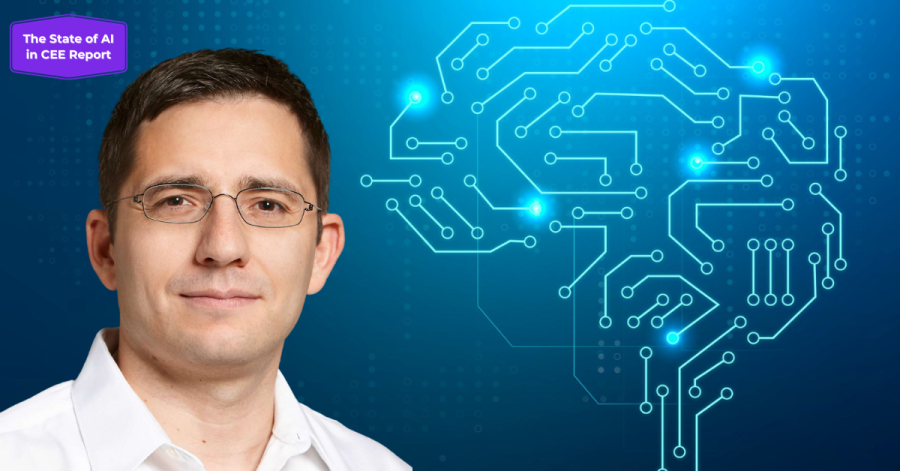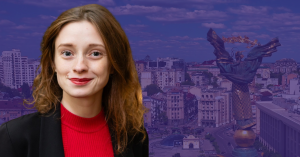“It is imperative for CEE to follow the INSAIT example: work on becoming a technological leader where technology is actually created, not just outsourced or applied. World-class research is absolutely fundamental, there is no way around this.”
Prof. Martin Vechev is a Full Professor of Computer Science at ETH Zurich where he leads the Secure, Reliable, and Intelligent Systems Lab. He is the founder and architect of INSAIT – Institute for Computer Science, Artificial Intelligence. He obtained his Ph.D. from the University of Cambridge, England. His work spans the broad intersection of artificial intelligence and programming languages, including both theoretical and system aspects. He has co-founded 3 startups in the area of Safe and Robust AI, Blockchain Security, and AI for Code (2 acquired).
Sofia-located INSAIT – Institute for Computer Science, Artificial Intelligence is the first of its kind in Eastern Europe to offer world-class research facilities and conditions. It was founded in April 2022, in partnership with Switzerland’s ETH Zurich and EPFL, and is closely advised and supervised by top academics from U.S., European, and Israeli universities and research labs. INSAIT is also the first research institution in Eastern Europe that became a part of the prominent European Laboratory for Learning and Intelligent Systems (ELLIS) network.
INSAIT has been funded with nearly $ 100M by the Bulgarian government over 10 years and about $15M from donations by big-tech companies such as AWS, Google, DeepMind, VMware, SiteGround, and others.
The following interview was conducted as a part of The Recursive’s “State of AI in CEE” report. Download the full report with insights from 40+ experts and an analysis of 900 AI product companies from CEE here.
The Recursive: What are some of the most promising AI research areas or applications that your organization is currently exploring?
Prof. Martin Vechev: We are currently exploring a range of strategic directions in AI: robotics, computer vision, AI for space data processing, trustworthy, safe, and ethical AI, quantum computing, and many others.
What is INSAIT’s strategy for commercializing research? Are there any plans for spin-out startups in the next 24 months based on the technologies developed inside the institute?
INSAIT’s strategy for commercialization is the same as that of all world-class universities such as MIT, Stanford, ETH Zurich, Technion, and similar. This strategy revolves around the same basic principle: get the best people and give them freedom to think and create. Many great startups will follow from here. INSAIT announced its first deep-tech startup (Martian Lawyers Club (MLC), ed. note) literally months after it started operating, demonstrating why this approach works in practice. I would say this is by far the most successful and proven model in the world for creating deep-tech companies. It’s really different from anything else that exists in CEE as of today, but with INSAIT, the situation is changing.
How do you think the upcoming EU AI regulatory framework will impact the adoption of AI products and services? Are there any specific implications for research institutions like INSAIT?
This is a very important topic as AI can really be used for all kinds of malicious purposes. I think regulations of some kind are a good idea, but they need to be carefully thought out, in order to avoid hampering innovation. INSAIT is very involved with regulations, and soon we will announce results that impact the enforcement of the regulatory framework.
Which are the current drivers of the European AI research industry in your view and what kind of initiatives can further boost its growth?
One of the most important global initiatives (EU level) is certainly ELLIS, an initiative that aims to unite Europe in order to be more competitive in AI. It is a network of research institutions and getting into ELLIS is not easy. For instance, not a single ELLIS unit exists in Eastern Europe (current units are in places like Oxford, Zurich, Haifa, etc.) and now INSAIT is the first one!
Aside from that, governments must have a strategy for building up and funding research, like INSAIT has done in Bulgaria. More and more governments are realizing this.
Which are the top AI specializations and skills in Bulgaria according to you?
I believe the strongest suit in Bulgaria is the mathematical background. Good AI rests on such skills. So this is something that should be encouraged and developed further.
What global AI trends do you think will have the most impact on the CEE region?
Some of the automation that the latest AI systems provide can be dangerous for CEE. This is because it will automate many outsourcing-type of tasks or call-center type of tasks, which are not uncommon in the region. This is why it is imperative for CEE to follow the INSAIT example: work on becoming a technological leader where technology is created, not just outsourced or applied. World-class research is absolutely fundamental, there is no way around this.








